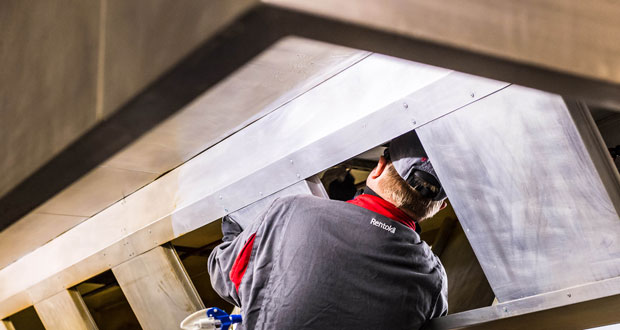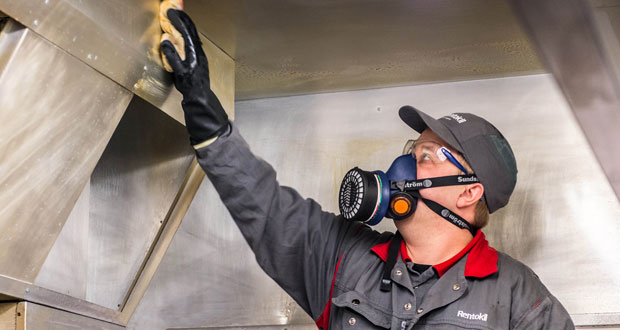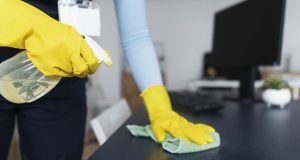 Jamie Woodhall, UK Technical and Innovations Manager, Rentokil Specialist Hygiene explores how the need to ensure kitchen extracts and ducts are deep cleaned is ever more important in the hospitality sector.
Jamie Woodhall, UK Technical and Innovations Manager, Rentokil Specialist Hygiene explores how the need to ensure kitchen extracts and ducts are deep cleaned is ever more important in the hospitality sector.
As people across the UK increasingly come together following the removal of the majority of Coronavirus restrictions, the hospitality sector is looking ahead to what may prove to be a busy summer. An influx of customers across hotels, bars and restaurants means that these businesses will need to be well equipped and as part of this preparation, business owners should focus on making sure their premises are safe, clean and hygienic.
The importance of kitchen ventilation cleaning Statistics from the Cheshire Fire & Rescue Service show that almost one in five businesses suffer some sort of disruption from an emergency, including fires, every year. Following such an incident, 25 per cent of businesses do not reopen, while 80 per cent of those that fail to recover within a month are likely to go out of business.
In most cases, commercial kitchens in pubs, restaurants and cafes feature kitchen extract and duct facilities – systems that could enable a fire to quickly spread if one does break out. As such, these areas need to be cleaned thoroughly and regularly to remove accumulations of fats, grease, oil and dirt.
What is TR19?
To ensure all extraction and ductwork systems are cleaned to a level that can reduce fire risks, it is recommended that businesses follow TR19 compliant standards. This is a set of best practice guidelines created by BESA (Building Engineering Services Association) as a way to standardise extract and duct cleaning. The goal of these guidelines is to reduce the growing number of commercial kitchen fires, protecting businesses, customers and staff alike.
Although it is not currently a legal requirement, TR19 is widely accepted within the building services sector, and by the UK insurance industry as an essential hygiene standard. In fact, many insurance policies contain conditions relating to cleaning regimes and kitchen extraction systems. For example, if a fire occurs that is shown to be associated with poor cleaning of ductwork, it could jeopardise a company’s right to indemnity for loss or damage.
Given this high risk of fire, kitchen extraction systems also warrant very close attention in the Fire Risk Assessment required under the Regulatory Reform (Fire Safety) Order 2005 and equivalent national legislation in Scotland and Northern Ireland. TR19 guidelines should be used to help inform this Risk Assessment, ensuring that all systems remain safe at all times.
Reassessing the level of commercial kitchen use
Over the past two years, where lockdowns forced hospitality companies to temporarily close, some businesses adapted and provided takeaway and delivery services to help meet demand and maintain income. With these innovations came a shift in the volume and type of cooking offered – even now with most restrictions lifted and a return ‘to normal’, some venues will be looking to make these service changes permanent.
Such operational changes may mean that the frequency of the extraction system and ductwork cleaning will need to be adjusted, as a cleaning frequency recommendation is calculated based on the accumulation of grease in the system. Therefore, it is crucial for hospitality business owners and managers to ensure that their cleaning activities continue at the recommended frequencies, or that it is recalculated by a professional if necessary, to help prevent fires and ensure the safety of both staff and customers.
How specialist cleaning professionals can help
To ensure compliance with TR19, premises need to provide cleaning professionals with adequate access to ductwork and inspection mechanisms, while making sure that post-cleaning verification methods are met. TR19 also states that, if a duct system cannot be fully cleaned, the certification will only report that it has received a partial clean and is not TR19 compliant.
Typically a TR19 compliant report includes statements that indicate how a premise’s system has been cleaned, alongside recommendations on cleaning frequency. A report should even include a schematic diagram or as-installed drawing of the whole system.
A certified cleaning specialist, such as professionals from Rentokil Specialist Hygiene, can help hospitality businesses to maintain TR19 compliance. When looking to work with a specialist, you should ensure they can provide a TR19 compliant kitchen ventilation deep cleaning service that includes a full compliance report from BESA-accredited grease hygiene technicians. Using a cleaning specialist company that is a BESA member also ensures that the specialists are constantly kept up-to-date with any changes to the criteria, meaning they can fully support businesses within a changing compliance market.
Cleaning specialists should also be members of the Ventilation Hygiene Elite Scheme (or an industry recognised equivalent), which enables them to have access to the BESCA portal so that their customer reports can be uploaded and audited. This also ensures that a Hygiene Certificate is provided to each of their customers, so it is recommended that you choose a professional who can provide this level of service.
Some cleaning specialists can also provide cleaning innovations and technology that further help achieve a full system deep clean that is TR19 compliant. For example, at Rentokil Specialist Hygiene we have invested in remote brushing equipment. This uses a hydraulic motor brush attached to a shaft that rotates throughout the duct system, quickly and effectively removing grease with safe access to the duct for a comprehensive, full clean.

Moving forward
It is important for business owners to remain vigilant with their hygiene standards, in order to successfully bounce back from the pandemic. As people become more willing to visit cafes, bars and restaurants, it is now vital that the hospitality industry ensures that the cleanliness of commercial kitchen extract and ductwork is up to scratch.





